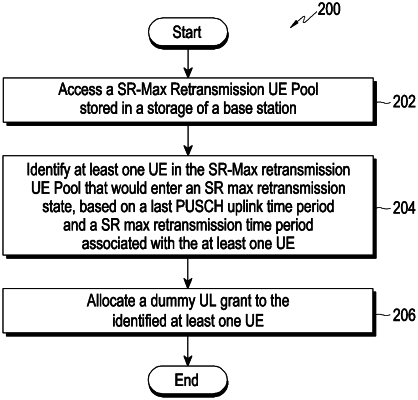| CPC H04W 72/1263 (2013.01) [H04L 1/08 (2013.01); H04W 72/02 (2013.01); H04W 72/21 (2023.01); H04W 72/23 (2023.01)] | 17 Claims |

|
1. A method of a base station, for handling Scheduling Request (SR) failure in a network, the method comprising:
accessing a SR max retransmission user equipment (UE) pool maintained in a storage of the base station, wherein the SR max retransmission UE pool includes a list of plurality of UEs, which experienced SR max retransmission;
identifying at least one UE in the SR max retransmission UE pool which would enter an SR max retransmission state based on a last Physical Uplink Shared Channel (PUSCH) uplink time period and a SR max retransmission time period associated with the at least one UE, wherein the last PUSCH uplink time period is a time period elapsed since last PUSCH packet from UE was received, and wherein the SR max retransmission time period is a time period after which the UE would enter the SR max retransmission state; and
allocating a dummy uplink (UL) grant to the identified at least one UE.
|